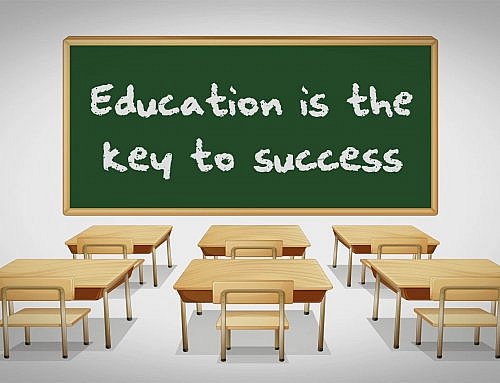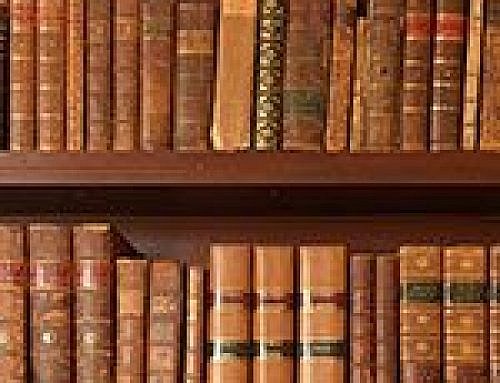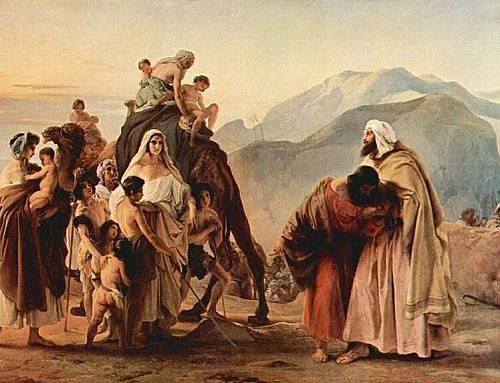Women have played a great, yet, often unheralded role in the birth of America and advancement of liberty. Since men have filled most positions of leadership in society, they generally are more visible when events of history are examined. While not occupying as prominent a public role, women and mothers have, nonetheless, filled a vital role that cannot be duplicated.
Most mothers in early America saw their most crucial role in society was to form the character of the next generation. They thought thatmen, in general, may lead the nation, but that they were the ones who would train the leaders. This was primarily carried out in the home.
John Adams wrote in a letter to his wife, Abigail: “I think I have some times observed to you in conversation, that upon examining the biography of illustrious men, you will generally find some female about them, in the relation of mother, or wife, or sister, to whose instigation a great part of their merit is to be ascribed.’’ (The Christian History of the American Revolution, Verna Hall, compiler, p. 74)

Speaking of famous men in history, Major Spalding said, “I have never known, and never read of one—no, not one!—who did not owe high standing, or a great name, to his mother’s blood, or his mother’s training.’’ (Ibid.)
People have debated in recent years whether women can compete with men in public life. Certainly they can, but let us never forget that no one can compete with a mother in the home—no one can fill her place. As more mothers have left the home in recent years, through choice or necessity, our nation has experienced more and more problems, for those who can best form the character of the next generation are having less and less input into the lives of their children—those who are the next generation. Neither the state, nor the school, nor even the church can effectively replace mom or dad in the home.
There have been many women who have contributed significantly to the well-being and advancement of America in the public sphere without neglecting their primary role as wives and mothers. One of these women was Anne Bradstreet (1612-1672), who became America’s first poet while remaining a dedicated Puritan wife and mother. Another was Martha Washington, who walked by the side of the Father of our country in all trials and triumphs with “uncomplaining endurance, and continual, unnoted self-sacrifice.’’
Many women stand out in the Revolutionary period. To mention a few: Lydia Darrah was a devout Quaker who risked her life to warn George Washington and the American troops of British plans to secretly attack them. She was successful and the troops were saved from likely defeat, and the possible termination of the war. Abigail Adams was a tremendous support and inspiration to her husband, John, who played a leading part in the struggle for independence and who served as our second President. Abigail also played a central role in the training of her son, John Quincy Adams, who served America in many capacities, including that of our sixth President.
The most notable female author and intellectual of the 18th century was Mercy Otis Warren. Many of her writings were published, including History of the Rise, Progress and Termination of the American Revolution. She wrote this work with a desire to be of use to the newly formed American republic. She thought a principal responsibility of her writings was “to form the minds, to fix the principles[,] to correct the errors, and to beckon by the soft allurements of love, as well as the stronger voice of reason, the young members of society (peculiarly my charge), to tread the path of true glory….’’ (Warren’s History, reprinted by Liberty Classics, p. xvii.)
In her writings, Mercy Warren not only saw an opportunity to benefit her country, but to also fulfill her role as a mother—“to cultivate the sentiments of public and private virtue in whatever falls from her pen.’’ (ibid.) She agreed with the common sentiment of her day that history should train people, especially young people, in “public and private virtue.’’ (Ibid., p. xxi.)
Many other women could be mentioned who contributed significantly to the development of America, both inside and outside of the home. This Providential Perspective contains some ideas and stories that help communicate the role of women, and the courage and determination they have displayed, in the growth of our nation. We began with a speech given by the great Christian statesman, Daniel Webster.
* * * * * * * *
Remarks to the Ladies of Richmond
Daniel Webster, October 5, 1840
Ladies,—I am very sure I owe the pleasure I now enjoy to your kind disposition, which has given me the opportunity to present my thanks and my respects to you thus collectively, since the shortness of my stay in the city does not allow me the happiness of calling upon those, severally and individually, from members of whose families I have received kindness and notice. And, in the first place, I wish to express to you my deep and hearty thanks, as I have endeavored to do to your fathers, your husbands, and your brothers, for the unbounded hospitality I have received ever since I came among you. This is registered, I assure you, in a grateful heart, in characters of an enduring nature. The rough contests of the political world are not suited to the dignity and the delicacy of your sex; but you possess the intelligence to know how much of that happiness which you are entitled to hope for, both for yourselves and for your children, depends on the right administration of government, and a proper tone of public morals. That is a subject on which the moral perceptions of woman are both quicker and juster than those of the other sex. I do not speak of that administration of government whose object is merely the protection of industry, the preservation of civil liberty, and the securing to enterprise of its due reward. I speak of government in a somewhat higher point of view; I speak of it in regard to its influence on the morals and sentiments of the community. We live in an age distinguished for great benevolent exertion, in which the affluent are consecrating the means they possess to the endowment of colleges and academies, to the building of churches, to the support of religion and religious worship, to the encouragement of schools, lyceums, and athenaeums, and other means of general popular instruction. This is all well; it is admirable; it augurs well for the prospects of ensuing generations. But I have sometimes thought, that, amidst all this activity and zeal of the good and the benevolent, the influence of government on the morals and on the religious feelings of the community is apt to be overlooked or underrated. I speak, of course, of its indirect influence, of the power of its example, and the general tone which it inspires.
“Mothers… work, not upon the canvas that shall perish, or the marble that shall crumble into dust, but upon mind, upon spirit, which is to last for ever, and which is to bear, for good or evil, throughout its duration, the impress of a mother’s… hand.’’–Daniel Webster
A popular government, in all these respects, is a most powerful institution; more powerful, as it has sometimes appeared to me, than the influence of most other human institutions put together, either for good or for evil, according to its character. Its example, its tone, whether of regard or disregard for moral obligation, is most important to human happiness; it is among those things which most affect the political morals of mankind, and their general morals also. I advert to this, because there has been put forth, in modern times, the false maxim, that there is one morality for politics, and another morality for other things; that, in their political conduct to their opponents, men may say and do that which they would never think of saying or doing in the personal relations of private life. There has been openly announced a sentiment, which I consider as the very essence of false morality, which declares that “all is fair in politics.’’ If a man speaks falsely or calumniously of his neighbor, and is reproached for the offence, the ready excuse is this:—“It was in relation to public and political matters; I cherished no personal ill-will whatever against that individual, but quite the contrary; I spoke of my adversary merely as a political man.’’ In my opinion, the day is coming when falsehood will stand for falsehood, and calumny will be treated as a breach of the commandment, whether it be committed politically or in the concerns of private life.
It is by the promulgation of sound morals in the community, and more especially by the training and instruction of the young, that woman performs her part towards the preservation of a free government. It is generally admitted that public liberty, and the perpetuity of a free constitution, rest on the virtue and intelligence of the community which enjoys it. How is that virtue to be inspired, and how is that intelligence to be communicated? Bonaparte once asked Madame de Stael in what manner he could best promote the happiness of France. Her reply is full of political wisdom. She said, “Instruct the mothers of the French people.’’ Mothers are, indeed, the affectionate and effective teachers of the human race. The mother begins her process of training with the infant in her arms. It is she who directs, so to speak, its first mental and spiritual pulsations. She conducts it along the impressible years of childhood and youth, and hopes to deliver it to the stern conflicts and tumultuous scenes of life, armed by those good principles which her child has received from maternal care and love.
If we draw within the circle of our contemplation the mothers of a civilized nation, what do we see? We behold so many artificers working, not on frail and perishable matter, but on the immortal mind, moulding and fashioning beings who are to exist for ever. We applaud the artist whose skill and genius present the mimic man upon the canvas; we admire and celebrate the sculptor who works out that same image in enduring marble; but how insignificant are these achievements, though the highest and the fairest in all the departments of art, in comparison with the great vocation of human mothers! They work, not upon the canvas that shall perish, or the marble that shall crumble into dust, but upon mind, upon spirit, which is to last for ever, and which is to bear, for good or evil, throughout its duration, the impress of a mother’s plastic hand.
I have already expressed the opinion, which all allow to be correct, that our security for the duration of the free institutions which bless our country depends upon habits of virtue and the prevalence of knowledge and of education. The attainment of knowledge does not comprise all which is contained in the larger term of education. The feelings are to be disciplined; the passions are to be restrained; true and worthy motives are to be inspired; a profound religious feeling is to be instilled, and pure morality inculcated, under all circumstances. All this is comprised in education. Mothers who are faithful to this great duty will tell their children, that neither in political nor in any other concerns of life can man ever withdraw himself from the perpetual obligations of conscience and of duty; that in every act, whether public or private, he incurs a just responsibility; and that in no condition is he warranted in trifling with important rights and obligations. They will impress upon their children the truth, that the exercise of the elective franchise is a social duty, of as solemn a nature as man can be called to perform; that a man may not innocently trifle with his vote; that every free elector is a trustee, as well for others as himself; and that every man and every measure he supports has an important bearing on the interests of others, as well as on his own. It is in the inculcation of high and pure morals such as these, that, in a free republic, woman performs her sacred duty, and fulfills her destiny. The French, as you know, are remarkable for their fondness for sententious phrases, in which much meaning is condensed into a small space. I noticed lately, on the title-page of one of the books of popular instruction in France, this motto:—“Pour instruction on the heads of the people! you owe them that baptism.’’ And, certainly, if there be any duty which may be described by a reference to that great institute of religion,—a duty approaching it in importance, perhaps next to it in obligation,—it is this.
I know you hardly expect me to address you on the popular political topics of the day. You read enough, you hear quite enough, on those subjects. You expect me only to meet you, and to tender my profound thanks for this marked proof of your regard, and will kindly receive the assurances with which I tender to you, on parting, my affectionate respects and best wishes.
The Works of Daniel Webster, Vol 2 (Boston: Little, Brown and Company, 1854), pp. 105-108.
* * * * * * *
A Good Lady and Her Two Sons
From Annals of the American Revolution, by Jedidiah Morse, 1824.
The female part of our citizens contributed their full proportion in every period, towards the accomplishment of the revolution. They wrought in their own way, and with great effect. An anecdote which we have just seen in one of our newspapers, will explain what I mean.
A good lady—we knew her when she had grown old—in 1775, lived on the sea-board, about a day’s march from Boston, where the British army then was. By some unaccountable accident, a rumour was spread, in town and country, in and about there, that the Regulars were on a full march for the place, and would probably arrive in three hours at farthest. This was after the battle of Lexington, and all, as might be well supposed, was in sad confusion—some were boiling with rage and full of fight, some with fear and confusion, some hiding their treasures, and others flying for life. In this wild moment, when most people, in some way or other, were frightened from their property, our heroine, who had two sons, one about nineteen years of age, and the other about sixteen, was seen by our informant, preparing them to discharge their duty. The eldest she was able to equip in fine style—she took her husband’s fowling-piece, “made for duck or plover,’’ (the good man being absent on a coasting voyage to Virginia) and with it the powder horn and shot bag; but the lad thinking the duck and goose shot not quite the size to kill regulars, his mother took a chisel, cut up her pewter spoons, and hammered them into slugs, and put them into his bag, and he set off in great earnest, but thought he would call one moment and see the parson, who said well done, my brave boy—God preserve you—and on he went in the way of his duty. The youngest was importunate for his equipments, but his mother could find nothing to arm him with but an old rusty sword; the boy seemed rather unwilling to risk himself with this alone, but lingered in the street, in a state of hesitation, when his mother thus upbraided him. “You John H*****, what will your father say if he hears that a child of his is afraid to meet the British, go along; beg or borrow a gun, or you will find one, child—some coward, I dare say, will be running away, then take his gun and march forward, and if you come back and I hear you have not behaved like a man, I shall carry the blush of shame on my face to the grave.’’ She then shut the door, wiped the tear from her eye, and waited the issue; the boy joined the march. Such a woman could not have cowards for her sons. Instances of refined and delicate pride and affection occurred, at that period, every day, in different places, and in fact this disposition and feeling was then so common, that it now operates as one great cause of our not having more facts of this kind recorded. What few there are remembered should not be lost. Nothing great or glorious was ever achieved which woman did not act in, advise, or consent to.
Jedidiah Morse, Annals of the American Revolution (Port Washington, NY: Kennikat Press, 1968. Reprint of original, first published in 1824.), p. 233.
* * * * * * * *
A Letter from a Lady of Philadelphia
From The Women of the American Revolution, by Elizabeth F. Ellet, 1849. (in Hall, p. 74)
A letter found among some papers belonging to a lady of Philadelphia, addressed to a British officer in Boston, and written before the Declaration of Independence, reads, in part:
“I will tell you what I have done. My only brother I have sent to the camp with my prayers and blessings. I hope he will not disgrace me; I am confident he will behave with honor, and emulate the great examples he has before him; and had I twenty sons and brothers they should go. I have retrenched every superfluous expense in my table and family; tea I have not drunk since last Christmas, nor bought a new cap or gown since your defeat at Lexington; and what I never did before, have learned to knit, and am now making stockings of American wool for my servants; and this way do I throw in my mite to the public good. I know this—that as free I can die but once; but as a slave I shall not be worthy of life. I have the pleasure to assure you that these are the sentiments of all by sister Americans. They have sacrificed assemblies, parties of pleasure, tea drinking and finery, to that great spirit of patriotism that actuates all degrees of people throughout this extensive continent. If these are the sentiments of females, what must glow in the breasts of our husbands, brothers, and sons! They are as with one heart determined to die of be free. It is not a quibble in politics, a science which few understand, that we are contending for; it is this plain truth, which the most ignorant peasant knows, and is clear to the weakest capacity—that no man has a right to take their money without their consent. You say you are no politician. Oh, sir, it requires no Machiavelian head to discover this tyranny and oppression. It is written with a sunbeam. Every one will see and know it, because it will make every one feel; and we shall be unworthy of the blessings of Heaven if we ever submit to it…. Heaven seems to smile on us; for in the memory of man, never were known such quantities of flax, and sheep without number. We are making powder fast, and do not want for ammunition.’’
* * * * * * * *
America’s First Black Poet, Phillis Wheatley
Phillis Wheatley (c. 1753-1784) was the first significant black writer in America, and her book of poems (1773) was probably the first book published by a black American. Her accomplishments are even more admirable when we consider her circumstances in life.
Phillis came as a slave to America from Africa in 1761, at about the age of eight. When she arrived she knew no English and was frail. While she quickly learned English, and much more, she remained frail all her life. Phillis was purchased by John and Susanna Wheatley who incorporated her into their family. Susanna and her daughter, Mary, tutored her in the Bible, English, Latin, history, geography and Christian principles. Phillis learned quickly and acquired a better education than most women in Boston had at the time.
Phillis began writing poetry at age twelve and many of her poems reflect her strong Christian faith. Due to the Wheatley’s influence and example, she had become a sincere Christian. At the age of 18, Phillis joined the Old South Congregational Church. She was not only glad to be a Christian, but was also proud to be an American. God was her first priority, followed by herself and the Wheatley family.
Shortly after her first book of poems was published in 1773 (this was accomplished primarily by the help of the Wheatleys, who had encouraged her in her writing for years), she was given her freedom by Mr. Wheatley. In her short life she gained much renown and met many famous people, including George Washington, about whom she had written a poem.
The following poem reveals Phillis Wheatley’s providential view of life, recognizing God’s hand in her own circumstances and history.
On Being Brought From Africa to America
by Phillis Wheatley
‘TWAS mercy brought me from my Pagan land,
Taught my benighted soul to understand
That there’s a God, that there’s a Saviour too:
Once I redemption neither sought nor knew.
Some view our sable race with scornful eye,
“Their colour is a diabolic die.’’
Remember, Christians, Negros, black as Cain,
May be refin’d, and join th’ angelic train.





